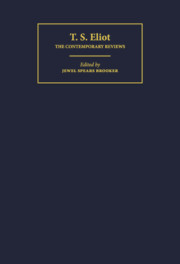Book contents
- Frontmatter
- Contents
- Series Editor's Preface
- Introduction
- Acknowledgments
- Prufrock and Other Observations (1917)
- Poems (1919); Ara Vos Prec (1920); Poems (1920)
- The Sacred Wood: Essays on Poetry and Criticism (1920, 1921)
- The Waste Land (1922)
- Homage to John Dryden (1924)
- Poems 1909–1925 (1925)
- For Lancelot Andrewes: Essays on Style and Order (1928, 1929)
- Dante (1929); Animula (1929); Marina (1930)
- Ash-Wednesday (1930)
- Selected Essays 1917–1932 (1932)
- Sweeney Agonistes (1932)
- The Use of Poetry and the Use of Criticism (1933)
- After Strange Gods: A Primer of Modern Heresy (1934)
- The Rock (1934)
- Murder in the Cathedral (1935)
- Collected Poems 1909–1935 (1936)
- The Family Reunion (1939)
- The Idea of a Christian Society (1939)
- East Coker (1940); Burnt Norton (1941); The Dry Salvages (1941); Little Gidding (1942); Four Quartets (1943)
- Notes Towards the Definition of Culture (1948, 1949)
- The Cocktail Party (1949, 1950)
- The Confidential Clerk (1954)
- The Elder Statesman (1959)
- Index
Ash-Wednesday (1930)
Published online by Cambridge University Press: 10 March 2010
- Frontmatter
- Contents
- Series Editor's Preface
- Introduction
- Acknowledgments
- Prufrock and Other Observations (1917)
- Poems (1919); Ara Vos Prec (1920); Poems (1920)
- The Sacred Wood: Essays on Poetry and Criticism (1920, 1921)
- The Waste Land (1922)
- Homage to John Dryden (1924)
- Poems 1909–1925 (1925)
- For Lancelot Andrewes: Essays on Style and Order (1928, 1929)
- Dante (1929); Animula (1929); Marina (1930)
- Ash-Wednesday (1930)
- Selected Essays 1917–1932 (1932)
- Sweeney Agonistes (1932)
- The Use of Poetry and the Use of Criticism (1933)
- After Strange Gods: A Primer of Modern Heresy (1934)
- The Rock (1934)
- Murder in the Cathedral (1935)
- Collected Poems 1909–1935 (1936)
- The Family Reunion (1939)
- The Idea of a Christian Society (1939)
- East Coker (1940); Burnt Norton (1941); The Dry Salvages (1941); Little Gidding (1942); Four Quartets (1943)
- Notes Towards the Definition of Culture (1948, 1949)
- The Cocktail Party (1949, 1950)
- The Confidential Clerk (1954)
- The Elder Statesman (1959)
- Index
Summary
*Gerald Heard.
"T. S. Eliot."
Week-End Review 1
(3 May 1930), 268–69.
Mr. Eliot is so serious a poet that he deserves, like all who have escaped from the idle singing through an empty day, to be noted, not for the way he says things, but for the things themselves. His style is that most living style, a language distinctive because it is fitted so closely to a personal thought. It is a symptom and can only be justly criticized if an attempt is made to judge the thought from which it springs. So his poetry, though highly stylized, may be appreciated by the ordinary thinking man. Mr. Eliot's poems are not written as exercises in prosody or illustrations of new sound-patterns; they are his philosophy. What he says, he says because not otherwise could he give expression to his strong conviction. The Waste Land could only be understood if it was realized how deeply the poet had suffered because of the war's desolation.
The clue to these six poems called Ash-Wednesday seems to be that the poet has entered on a new stage of his life. Adhesit pavimento might still be written over them, but also De profundis, for the strongest feeling that they give is of a spirit's communing. They do not seem addressed to any public, still less to appreciators of verse.
This, of course, is not to say that they will not interest poetry lovers; but certainly such will be distracted from their love of pure expression by the way that philosophy will keep breaking in.
- Type
- Chapter
- Information
- T. S. EliotThe Contemporary Reviews, pp. 175 - 192Publisher: Cambridge University PressPrint publication year: 2004

